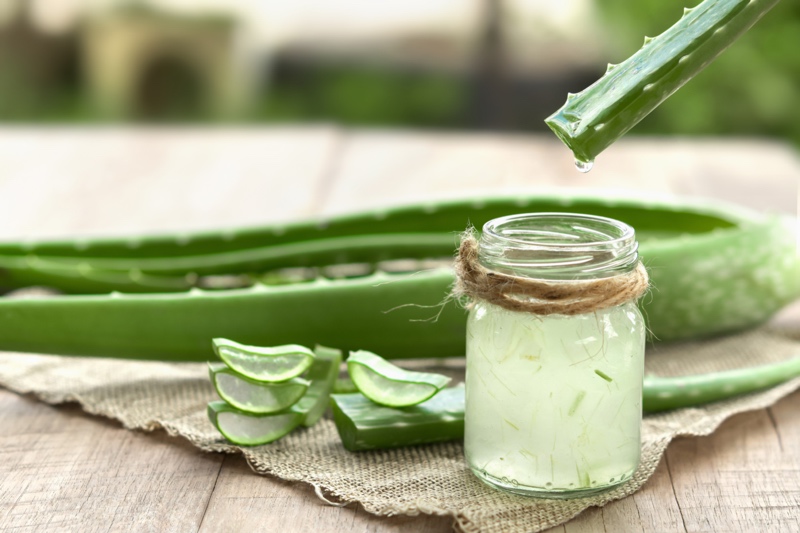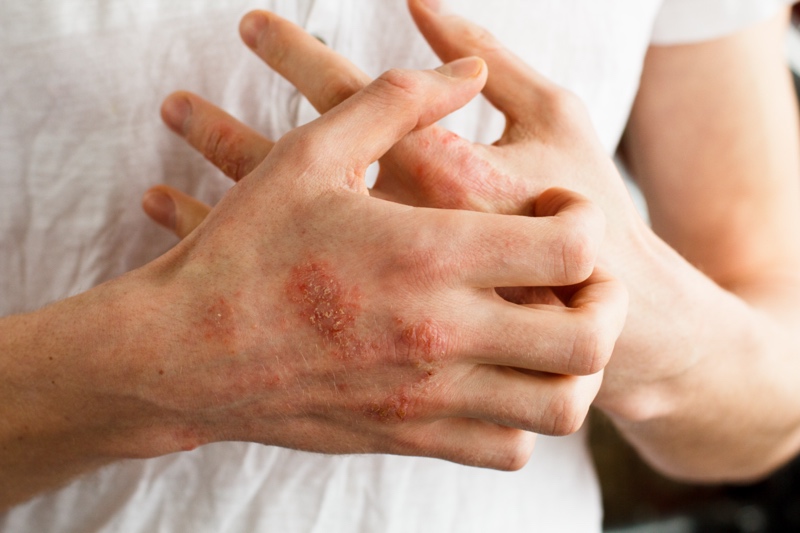Can you use Aloe Vera for Eczema conditions?
No, Aloe vera can’t be a treatment for eczema, although because of its soothing, anti-inflammatory & anti-bacterial properties, it can definitely calm the inflamed Eczema & give you some relaxation with your itching discomfort.
How does Aloe vera affect Eczema?

- Eczema has dry, patchy & broken skin which is an invitation for bacterial & fungal infections on the skin & our friend aloe vera contains anti-fungal & anti-bacterial properties which kill the bacteria & its anti-inflammatory & healing properties calm the calm.
- Aloe Vera is mildly astringent (it has zinc in it). Astringent is a chemical that causes the tightening of skin cells & other body tissues. They tighten pores & dry out oils. Astringent is also slightly acidic & bitter in taste. Hence when you apply Aloe Vera on the face, you get that tightening or perhaps shrinking feeling of the skin cells. You can apply a layer of Moisturizer on it to subdue that uncomfortable tightness.
- Aloe vera is very rich in antioxidants & hence speeds up the regeneration of damaged skin & hence known as a healer.
- Aloe vera is a multi-tasker & people use it to treat all kinds of skin problems including:
- Sunburns (for sunburns, prevention is better than cure)
- Razor cuts
- Dryness
- Dullness
- Peeled skin
- Burnt skin
- Frostbites
- Rashes
- Wound healing
- Skin Irritation & infections
How to use topical Aloe vera?
- First, clean your skin thoroughly with a gentle cleanser so that it is maximum receptive to it.
- Then apply aloe vera in gel or pure aloe vera scraped from the aloe leaf (anything you have available).
- After it is absorbed in, seal it with a thick cream or moisturizer.
- You can apply it before sleeping or in the morning or both.
Are there any side effects of Aloe Vera?
No, anything which can be eaten never has severe side effects on the skin unless you are particularly allergic to that ingredient. Some people even drink aloe vera juice so no side effects but just to be sure do a patch test & see. Mild side effects of aloe vera can include redness or itchiness which can go away if you wash off the face.
What is Eczema?

Also known as Atopic Dermatitis, it is a skin condition that causes dry, patchy, itchy & inflamed skin. It’s mostly a long-lasting condition but noncontagious.
There are 7 types of Eczema
- Atopic Dermatitis
- Contact Dermatitis
- Neuro Dermatitis
- Dyshidrotic eczema
- Nummular eczema
- Seborrheic Dermatitis
- Stasis Dermatitis
What causes Eczema?
This skin condition is mostly caused by Genetics, immune system activation & sometimes environmental triggers bring out the condition and aggravate it.
This condition could also be a side effect of inflammation. The first thing you do is look at your diet & determine if anything you’re eating might trigger inflammation in your body. Cut all the processed, packaged food, gluten & sugar immediately, add probiotics to your diet & see if you feel any better.
What triggers Eczema more?
- Environmental Allergies – Allergies from dust mites, pollen, mold & pet dander- Vacuum your floor, carpet, and furniture often & manage the humidity. It should be under 50%.
- Food Allergies – Eczema sufferers get a food allergy test if they really can. Super helpful to know what can trigger your eczema. Some people complain about dairy products. There could be something else that triggers yours.
- All Retinoids, Alpha hydroxy & Beta hydroxy acids – They are too harsh for your skin!
- Essential oils- Too strong and harsh for your skin
- Hot water- Use cold or lukewarm water for showers.
- Fragranced cosmetics- Scented soaps, body washes, cleansers, and moisturizers will add to the problem. Buy fragrance/alcohol-free cosmetics.
- Temperature- Extreme temperatures like dry + cold or hot + humid won’t work for you. You need a balanced temperature. Use either a humidifier/dehumidifier at home acc. to where you live.
- Sweat- Take a shower right after your workout
- Pool water- Take a shower & rinse off that chlorinated pool water from you with a gentle cleanser.
- Scratching- It will lead to more skin troubles like blisters or scars
- Not moisturizing enough – Buy moisturizers loaded with ceramide, niacinamide, or hyaluronic acid and apply them 2-3 times a day esp. on damp skin.
- Not bathing enough- Bathing once a day every day with cold/lukewarm water will calm a lot of problems like any allergies, dead skin cells, dry flaky skin, and fur shedding of your pet. Don’t use harsh soap pls & keep the shower time less than 10 mins.
- Stress- Nothing can kick off a flare faster than being under stress.
- Prioritize sleep- Your skin will heal better when you sleep for 8 hours & if you’re sleep deprived, it will trigger stress responses in the body that further provokes itch. It’s a vicious cycle.
- Complicated skincare- keep it simple, figure out 4 things that suit your skin & stick to them. The more products you’re using, the more exposure to potential irritants increases.
- Makeup- Take it off completely at the end of the day. The ingredients in makeup have all the power to aggravate your eczema if left on for a long time, esp. eye makeup
- Certain Fabrics- Rough synthetic fabrics badly trigger eczema-like polyester, latex, wool, denim, leather, and nylon. Switch to 100% cotton, bamboo & silk fabrics.
Other Natural remedies for treating Eczema
- Add carrot & beet juice to your diet. Do not strain the fiber.
- Make a fresh glass of cucumber juice with lemongrass & basil & have it in the morning
- Have watermelon or watermelon juice
- Add Sesame, pumpkin, and sunflower seeds to your diet.
- Add vitamin E-enriched foods like Almonds, avocadoes, black currents, spinach, and flax seeds oil.
- Add zinc, asparagus & spinach to your diet.
- Avoid food with hydrogenated fats (cookies, donuts, etc.) & white sugar.
- Avoid alcohol
- Take Epsom salt bath three times a week
- Sunbath for 20 min at least
- Drink Chamomile tea
- Lighter facial oils, like marula & flaxseed oil. Mix them together. Add them to your moisturizer for max hydration.
- Eat probiotic-rich foods like sourdough bread, miso soup, kimchi & fermented pickles, etc.
- Try Relaxation techniques like meditation, yoga, music therapy, breathing exercises, tai chi, or simply any hobby which relaxes your soul.
- Water filters! Hard water is very damaging to skin, hair & body. Pls, invest in a good water filter for drinking & a nice water softener for your showers. (Try from water sticks, it did help me)
Face masks, especially for dry skin conditions
- Almond face mask- make a paste of soaked almond, aloe vera, yogurt, honey & oats & apply for 20 mins on the face. Wash it off with lukewarm water. Do it 4 times a week.
- Gram flour face mask- mix gram flour, aloe vera gel & yogurt. Apply for 15 min. Wash it off. It is very mild & brightening. You can even use it every day.
- Neem face mask- mix neem powder (or best if you have fresh neem paste) & turmeric. It is antibacterial & will leave your skin very fresh and clean.
- Avocado face Mask- Take ½ avocado, 1 tsp honey, aloe vera & some yogurt, mix them & apply. It’s a pure hydration bomb for your dry skin.
- Oatmeal- Oatmeal is very moisturizing for dry skin. You can make a face mask of it by simply mixing it with rosewater & aloe vera gel or you can put some oat powder in the bathtub & soak your body in it completely for 20 minutes. Then Pat dry & apply a hypoallergenic moisturizer. If you’re low on time, buy organic oatmeal soap.
- Tee tree face mask- a few drops of tea tree oil, rose water, aloe vera gel, and fuller’s earth. Apply for 20 mins and rinse. Tee tree is anti-bacterial, rose water will hydrate your skin & fuller’s earth will clean the pores beautifully.
- Banana face mask- Add ½ banana mashed, aloe vera, 2 tablespoons of plain cottage cheese, and 1 t-spoon of honey. It’s a very creamy hydrating mask
- Wheatgrass mask- It’s a cooling hydrating mask, add ¼ cup plain yogurt with 3 tsp of aloe vera gel and 2 tsp of wheatgrass juice.
- & Lastly, Vitamin C serum & mineral-based sunscreen are your great friends.
Hope these tips can help your dry skin in some way.
Love ~ Beauty stroll